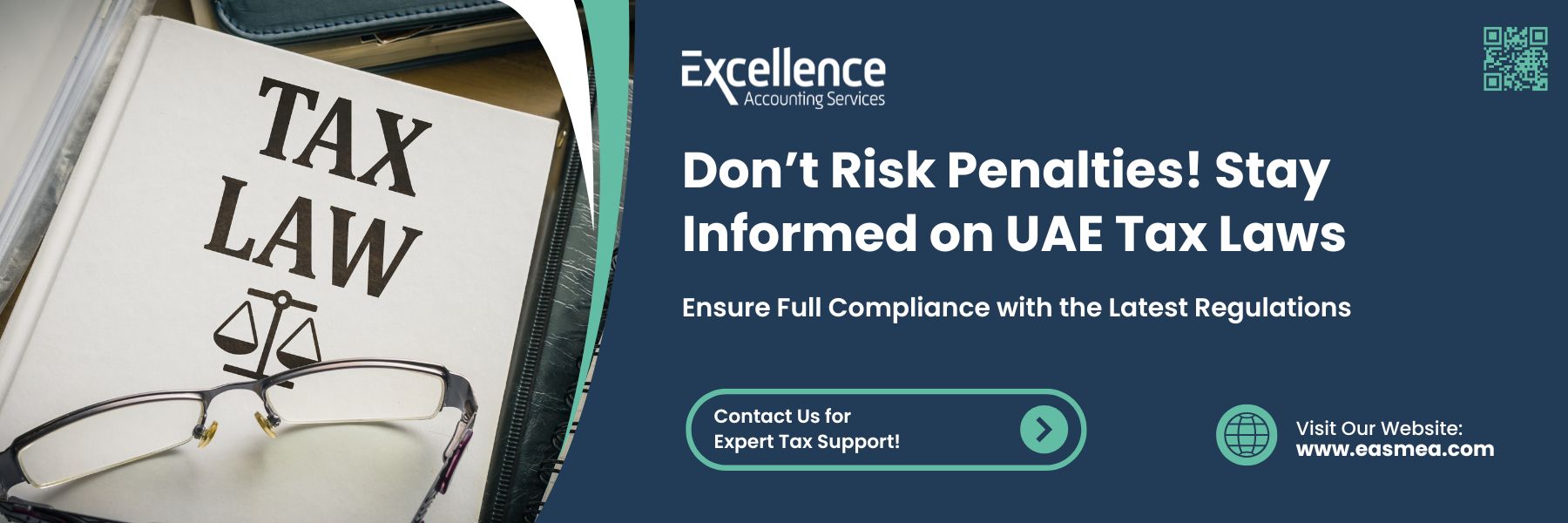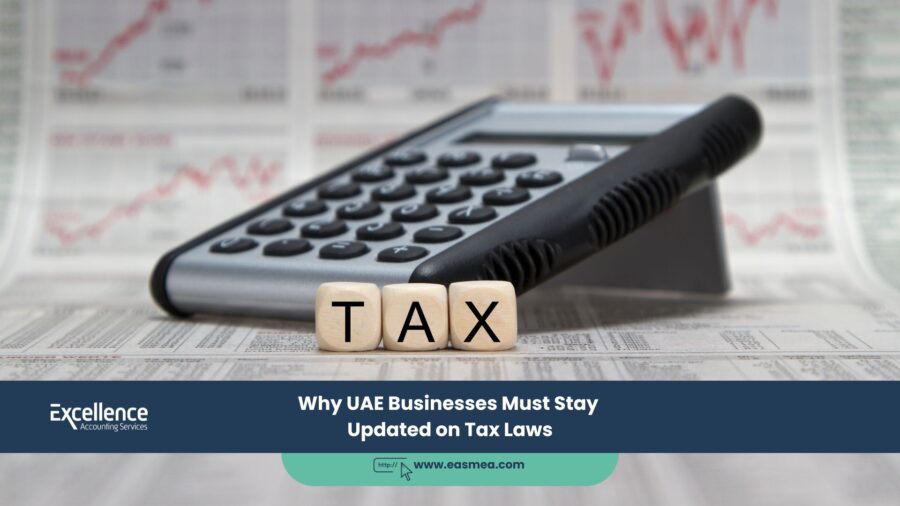The United Arab Emirates (UAE) has transformed into a global business hub, attracting companies worldwide. A key factor in this growth is the UAE’s business-friendly environment, which includes a dynamic tax system. While often perceived as having a low-tax regime, the introduction of corporate tax and other regulations necessitates a thorough understanding of the applicable laws. Staying informed about UAE tax laws is no longer optional; it’s a critical requirement for UAE businesses of all sizes operating within the country.
This comprehensive guide will delve into the reasons why UAE businesses must prioritize staying updated on tax laws. We will explore the evolving tax landscape, discuss key regulations, highlight the potential consequences of non-compliance, and demonstrate how proactive tax management can contribute to business success. By the end of this post, you’ll understand why staying informed about UAE tax laws is not just a compliance issue, but a strategic imperative.
Key Takeaways:
- Understanding and complying with UAE tax laws is crucial for avoiding penalties and maintaining a positive business reputation.
- Staying updated on tax law changes allows UAE businesses to adapt their strategies and optimize their tax liabilities.
- Proactive tax management can lead to cost savings and improved financial performance.
- Partnering with tax experts can provide valuable guidance and support in navigating the complex tax landscape.
- Ignoring tax law updates can result in significant financial and legal risks.

The Evolving Landscape of UAE Tax Laws
The UAE’s tax system has undergone significant changes in recent years, moving from a primarily tax-free environment to a more structured system. This evolution requires businesses in UAE to be vigilant and adaptable.
The Introduction of Corporate Tax
The introduction of corporate tax in UAE represents a major shift in the country’s tax landscape. This tax applies to most businesses in Dubai UAE and requires them to pay a percentage of their taxable income to the government. This fundamental change necessitates a comprehensive understanding of the new regulations and their implications for businesses of all sizes. It impacts financial planning, reporting, and overall business strategy.
Furthermore, it is important to note that the corporate tax regime also includes free zones, which can have different tax implications. Free zone businesses in UAE must carefully analyze the specific regulations applicable to their zone and activities to ensure compliance and optimize their tax position. Understanding the interaction between free zone regulations and the broader corporate tax law is crucial for strategic decision-making.
Comparison of Corporate Tax Rates in the UAE and Other GCC Countries
| Country | Corporate Tax Rate |
|---|---|
| UAE | 9% (for taxable income above AED 375,000) |
| Saudi Arabia | 20% |
| Oman | 15% |
| Bahrain | 0% (with some exceptions) |
| Kuwait | 0% (with some exceptions) |
| Qatar | 10% |
Highlights:
- Understanding the specific rules and regulations related to corporate tax is essential for UAE businesses to ensure compliance.
- UAE Businesses need to accurately calculate their taxable income and file their corporate tax returns on time.
Value Added Tax (VAT) Implementation
The implementation of VAT in the UAE has also had a significant impact on businesses. VAT is a consumption tax that is levied on most goods and services. This indirect tax affects UAE businesses across various sectors and requires them to adapt their accounting and pricing strategies. Understanding the complexities of VAT, including registration requirements, input and output tax calculations, and compliance procedures, is crucial for smooth business operations.
Moreover, UAE businesses must stay informed about any updates or changes to the VAT regulations, as these can impact their compliance obligations and financial performance. Regularly reviewing the FTA website and seeking professional advice can help businesses stay ahead of any changes and ensure continued compliance.
Highlights:
- UAE Businesses are required to register for VAT if their annual turnover exceeds a certain threshold.
- Registered businesses in Dubai and UAE must collect VAT from their customers and remit it to the government.
VAT is a broad-based consumption tax. It’s crucial for businesses to understand the intricacies of VAT to ensure proper accounting and compliance.
VAT Rates in the UAE
| Type of Supply | VAT Rate |
|---|---|
| Standard Rated Supplies | 5% |
| Zero Rated Supplies | 0% |
| Exempt Supplies | Exempt |
Why Staying Updated on UAE Tax Laws is Essential
Staying updated on UAE tax laws is not just a matter of compliance; it’s a strategic imperative for businesses looking to thrive in the UAE’s competitive market.
Avoiding Penalties and Legal Issues
Non-compliance with UAE tax laws can result in hefty penalties, legal issues, and damage to a business’s reputation. These penalties can range from monetary fines to more severe consequences, such as business license revocation or legal action. Maintaining a strong reputation is crucial for attracting customers, investors, and partners. Demonstrating a commitment to compliance builds trust and enhances a business’s credibility in the market.
Furthermore, legal issues arising from tax non-compliance can be time-consuming and costly to resolve, diverting resources from core business activities. Proactive tax management and compliance can help UAE businesses avoid these legal pitfalls and focus on their strategic objectives.
Steps to Avoid Penalties:
- Stay informed about tax law changes.
- Maintain accurate financial records.
- File tax returns on time.
- Seek professional tax advice when needed.
Highlight: Penalties for non-compliance can range from monetary fines to business license revocation.
Optimizing Tax Liabilities
Staying updated on tax laws allows businesses in Abu Dhabi and UAE to identify opportunities to optimize their tax liabilities and reduce their tax burden. This can involve understanding available tax exemptions, deductions, and incentives that are applicable to their specific business activities. Effective tax planning can free up resources that can be reinvested in the business, contributing to growth and expansion.
Moreover, staying informed about tax law changes can help businesses in UAE anticipate potential tax implications and adjust their strategies accordingly. This proactive approach to tax management can provide a competitive advantage and contribute to long-term financial stability.
Example: Understanding available tax exemptions and deductions can significantly impact a business’s bottom line.
How to Stay Updated on UAE Tax Laws
Staying informed about UAE tax laws requires a proactive approach and a commitment to continuous learning.
Utilizing Official Government Resources
The Federal Tax Authority (FTA) website is a valuable resource for businesses in UAE seeking information on UAE tax laws. The website provides access to official tax laws, regulations, guides, and updates, ensuring businesses have access to the most current information. Regularly checking the FTA website is essential for staying informed about any changes or updates to the tax laws.
In addition to the website, the FTA also publishes various guides and publications to help UAE businesses understand the intricacies of the tax system. These resources can provide valuable insights into specific tax-related topics and help UAE businesses navigate the complexities of compliance.
Highlight: The FTA website provides access to tax laws, regulations, guides, and updates.
Engaging with Tax Professionals
Consulting with experienced tax professionals can provide UAE businesses with personalized guidance and support in navigating the complex tax landscape. Tax professionals possess in-depth knowledge of the tax laws and can help UAE businesses understand the implications of any changes or updates. They can also provide valuable assistance with tax planning, compliance, and representation before tax authorities.
Moreover, tax professionals can help UAE businesses identify opportunities to optimize their tax liabilities and minimize their tax burden. Their expertise can be invaluable in developing effective tax strategies that align with a business’s overall goals and objectives.
Highlight: Tax professionals can help UAE businesses understand the implications of tax law changes and develop effective tax strategies.
What Excellence Accounting Services Can Offer
Excellence Accounting Services offers a comprehensive suite of tax services to help UAE businesses navigate the complexities of the tax landscape. We understand the unique challenges faced by businesses in the UAE and provide tailored solutions to meet their specific needs.
Our Services Include:
- Tax registration and compliance
- Corporate tax advisory
- VAT consulting
- Tax planning and optimization
- Representation before tax authorities
We stay up-to-date on the latest tax law changes and provide proactive guidance to ensure our clients remain compliant and optimize their tax position. Our team of experienced tax professionals is dedicated to providing high-quality services and building long-term relationships with our clients. We prioritize understanding our clients’ specific business needs and tailor our services accordingly.
Furthermore, we offer ongoing support and guidance to help businesses navigate the ever-evolving tax landscape. Our commitment to excellence and client satisfaction makes us a trusted partner for businesses seeking comprehensive tax solutions.
Comparison of Tax Services Offered by Excellence Accounting Services and Other Firms
| Service | Excellence Accounting Services | Competitor A | Competitor B |
|---|---|---|---|
| Tax Registration | Yes | Yes | Yes |
| Corporate Tax Advisory | Yes | Limited | Yes |
| VAT Consulting | Yes | Yes | Limited |
| Tax Planning | Yes | Limited | No |
| Representation before Tax Authorities | Yes | No | Yes |
| Tax Health Checks | Yes | No | No |
| International Tax Advisory | Yes | Limited | No |
| Transfer Pricing Services | Yes | No | No |
| Tax Training | Yes | No | No |
Key Point: Partnering with Excellence Accounting Services can provide businesses with the expertise and support they need to navigate the UAE’s evolving tax landscape. Our comprehensive range of services and commitment to client satisfaction make us a valuable asset for businesses of all sizes.
FAQ: Frequently Asked Questions about UAE Tax Laws
Navigating the intricacies of UAE tax laws can be complex. This FAQ section aims to provide clear and concise answers to some of the most common questions UAE businesses have regarding taxation in the UAE. We’ve structured these answers to be informative and easy to understand, covering key aspects of corporate tax, VAT, compliance, and more. Understanding these fundamental concepts is crucial for any business operating in the UAE.
Corporate tax in the UAE is a direct tax levied on the taxable income of businesses. It represents a significant shift in the UAE’s tax landscape, moving from a primarily tax-free environment to a more structured system. This tax applies to most businesses operating in the UAE, with some specific exceptions, such as certain free zone entities that meet specific criteria.
The standard corporate tax rate is 9% for taxable income exceeding AED 375,000. Understanding the calculation of taxable income is crucial, which involves considering revenues, expenses, and allowable deductions.
| Key Aspects of UAE Corporate Tax | Description |
|---|---|
| Taxable Income Threshold | AED 375,000 |
| Standard Tax Rate | 9% |
| Free Zone Implications | Specific conditions apply for 0% rate |
| Tax Returns | Required annually |
| Compliance | Crucial to avoid penalties |
Key Points:
- Corporate tax applies to most businesses in the UAE.
- The standard rate is 9% for income above AED 375,000.
- Free zones have specific regulations regarding corporate tax.
- Accurate record-keeping is essential for corporate tax compliance.
Staying informed about updates to the regulations and interpretations of the law is equally important. Businesses should consult with tax professionals to ensure they understand the implications of corporate tax for their specific situation and maintain compliance with all applicable regulations.
Value Added Tax (VAT) is a consumption tax levied on most goods and services in the UAE. It’s an indirect tax, meaning it’s collected by businesses on behalf of the government. Businesses with an annual turnover exceeding the mandatory registration threshold (currently AED 375,000) are required to register for VAT, collect VAT from their customers on taxable supplies, and remit it to the Federal Tax Authority (FTA).
Understanding the mechanics of VAT, including input and output tax calculations, is crucial for proper accounting and compliance.
| VAT Aspects | Details |
|---|---|
| Registration Threshold | AED 375,000 |
| Standard Rate | 5% |
| Zero-Rated Supplies | 0% (e.g., certain exports, basic food items) |
| Exempt Supplies | Exempt from VAT (e.g., certain healthcare services) |
| VAT Returns | Regular submissions required |
Highlights:
- VAT is a consumption tax applied to most goods and services.
- Businesses above the threshold must register for VAT.
- Understanding zero-rated and exempt supplies is crucial.
- Accurate record-keeping is essential for VAT compliance.
Navigating the intricacies of VAT, including understanding zero-rated and exempt supplies, input and output tax calculations, record-keeping requirements, and compliance procedures, is vital for smooth business operations and avoiding penalties. Businesses should invest in training for their staff to ensure proper VAT handling.
Staying updated on UAE tax laws requires a proactive and consistent approach. Given the dynamic nature of the tax landscape, relying on outdated information can lead to non-compliance and penalties. Several resources are available to help businesses stay informed.
Recommended Resources:
- Federal Tax Authority (FTA) Website: The official source for tax laws, regulations, guides, and updates.
- Tax Professionals: Consulting with experienced tax professionals provides personalized guidance.
- Industry Newsletters and Publications: Subscribing to reputable sources keeps businesses informed about the latest developments.
- Workshops and Seminars: Attending these events offers valuable insights and networking opportunities.
Key Actions:
- Regularly check the FTA website for updates.
- Consult with a tax advisor for personalized guidance.
- Subscribe to relevant industry newsletters.
- Attend tax-related workshops and seminars.
Consistent monitoring and proactive engagement are key to navigating the evolving tax landscape and ensuring compliance. Businesses should establish a system for tracking tax law changes and communicating them to relevant personnel within the organization.
Non-compliance with UAE tax laws can result in a range of penalties, from monetary fines to more severe consequences like business license revocation and legal action. The severity of the penalty typically depends on the nature and extent of the non-compliance.
| Type of Non-Compliance | Potential Penalties |
|---|---|
| Late VAT Registration | Administrative fines |
| Failure to submit VAT returns | Penalties based on the tax due |
| Tax evasion | Significant fines and potential legal action |
| Incorrect tax declarations | Penalties and interest on unpaid tax |
| Failure to maintain proper records | Fines and potential audits |
Key Considerations:
- Penalties can be substantial and impact business finances.
- Reputational damage can also result from non-compliance.
- Legal action can be taken in cases of serious tax evasion.
Avoiding these penalties requires a commitment to compliance, accurate record-keeping, timely filing of returns, and proactive tax management. Businesses should implement internal controls and procedures to ensure adherence to tax regulations and seek professional advice when needed.
Optimizing tax liabilities involves legally reducing your tax burden. This requires a thorough understanding of applicable tax laws, regulations, and available incentives. Several strategies can be employed.
Tax Optimization Strategies:
- Utilize available tax exemptions and deductions: Take advantage of any exemptions or deductions that apply to your business.
- Claim eligible tax credits: Explore available tax credits for specific activities or investments.
- Properly classify expenses: Ensure expenses are correctly classified for tax purposes.
- Structure transactions efficiently: Optimize the tax implications of business transactions.
- Consult with a tax professional: A tax advisor can help develop a tailored tax optimization strategy.
Important Considerations:
- Tax optimization must be done legally and ethically.
- It’s crucial to maintain accurate records to support tax claims.
- Professional advice is recommended to ensure compliance.
Consulting with a tax professional can help you develop a tailored tax optimization strategy that aligns with your business goals and minimizes your tax burden while ensuring compliance with all applicable regulations. Regularly reviewing your tax strategy is also essential to adapt to changing tax laws and business circumstances.
The UAE offers several tax incentives to attract foreign investment, promote specific industries, and encourage economic growth. These incentives can significantly benefit businesses operating in the UAE. Understanding these incentives and determining eligibility is crucial for optimizing tax liabilities and enhancing competitiveness.
Types of Tax Incentives:
- Free Zone Incentives: Many free zones offer 0% corporate tax rates for qualifying income, attracting businesses engaged in specific activities.
- Industry-Specific Incentives: Certain industries, such as technology, research and development, or renewable energy, may have specific tax benefits.
- Geographic Incentives: Specific regions or emirates might offer tax incentives to encourage business development.
- SME Support: Small and medium-sized enterprises (SMEs) may qualify for specific tax breaks or support programs.
- Investment Incentives: Incentives may be available for investments in specific sectors or projects.
Key Considerations:
- Eligibility criteria vary for different incentives.
- Businesses must meet specific conditions to qualify.
- Staying informed about available incentives is crucial.
Researching available incentives and determining eligibility is a crucial step for businesses looking to optimize their tax position and enhance their competitiveness. Consulting with a tax advisor can help businesses identify relevant incentives and navigate the application process.
UAE tax laws are subject to change and can be updated periodically. The frequency of updates depends on various factors, including economic conditions, government policies, and international best practices. Staying informed about these changes is essential for maintaining compliance and adapting tax strategies accordingly.
Factors Influencing Tax Law Updates:
- Economic conditions and government revenue needs.
- Changes in international tax regulations and standards.
- Updates to tax treaties and agreements.
- Feedback from businesses and tax professionals.
- Technological advancements and automation in tax administration.
Importance of Staying Updated:
- Ensures compliance with the latest regulations.
- Allows businesses to adapt their tax strategies.
- Helps avoid penalties for non-compliance.
- Enables businesses to take advantage of new incentives.
Regularly checking official sources like the FTA website, subscribing to legal and tax updates, and engaging with tax professionals can help businesses stay ahead of any updates and maintain compliance. Establishing internal processes for monitoring and disseminating tax law changes is also crucial.
The Federal Tax Authority (FTA) is the government body responsible for administering and enforcing tax laws in the UAE. The FTA plays a crucial role in the UAE’s tax system, ensuring compliance, providing guidance to taxpayers, and collecting tax revenues.
Key Functions of the FTA:
- Implementing and enforcing tax laws and regulations.
- Providing guidance and resources to taxpayers.
- Managing tax registration and filing processes.
- Conducting tax audits and investigations.
- Resolving tax disputes and appeals.
- Collecting tax revenues.
Importance of Understanding the FTA’s Role:
- Businesses must interact with the FTA for tax compliance.
- Understanding FTA procedures is essential for smooth tax management.
- The FTA website is a valuable resource for tax information.
Understanding the FTA’s role and utilizing their resources, such as publications, guides, and online services, is essential for navigating the UAE tax system effectively. Businesses should establish a good working relationship with the FTA and seek clarification on any tax-related matters.
Yes, free zones in the UAE often have different tax regulations compared to mainland businesses. While many free zones offer a 0% corporate tax rate for qualifying income, it’s crucial to understand the specific regulations applicable to each free zone and the conditions that must be met to maintain this tax benefit.
Key Differences in Free Zone Tax Regulations:
- Corporate tax rates may vary between free zones.
- Specific conditions apply for 0% corporate tax benefits.
- VAT regulations may differ for free zone businesses.
- Reporting requirements may vary between free zones.
Importance of Understanding Free Zone Tax Regulations:
- Businesses operating in free zones must comply with specific rules.
- Understanding the tax implications is crucial for free zone business planning.
- Consulting with tax professionals specializing in free zones is recommended.
Businesses operating in free zones should consult with tax professionals to ensure they understand the specific tax implications and compliance requirements applicable to their chosen free zone. Regularly reviewing the free zone’s tax regulations is also essential.
A tax consultant can provide valuable guidance and support in navigating the complex UAE tax landscape. Their expertise can be invaluable in helping businesses understand and comply with tax laws, optimize their tax liabilities, and avoid costly penalties.
Benefits of Hiring a Tax Consultant:
- Expert knowledge of UAE tax laws and regulations.
- Assistance with tax planning and optimization strategies.
- Guidance on tax compliance and reporting requirements.
- Representation before tax authorities in case of audits or disputes.
- Help with understanding and implementing tax law changes.
- Training for staff on tax compliance.
- Identification of potential tax risks and mitigation strategies.
Key Considerations When Choosing a Tax Consultant:
- Experience and expertise in UAE tax laws.
- Reputation and client testimonials.
- Range of services offered.
- Fees and billing structure.
Partnering with a tax consultant can be a strategic investment for businesses looking to minimize tax risks, maximize tax efficiency, and focus on their core business activities. A good tax consultant can act as a trusted advisor, helping businesses navigate the complexities of the tax system and achieve their financial goals.
Conclusion
Staying updated on UAE tax laws is not just a matter of compliance; it’s a strategic imperative for businesses seeking sustainable growth and success in the UAE. The evolving tax landscape, including the introduction of corporate tax and VAT, necessitates a proactive approach to tax management.
By staying informed, engaging with tax professionals, and utilizing available resources, businesses can navigate the complexities of the UAE tax system, optimize their tax liabilities, and avoid costly penalties. Proactive tax management is an investment that can significantly contribute to a business’s financial health and long-term success.




